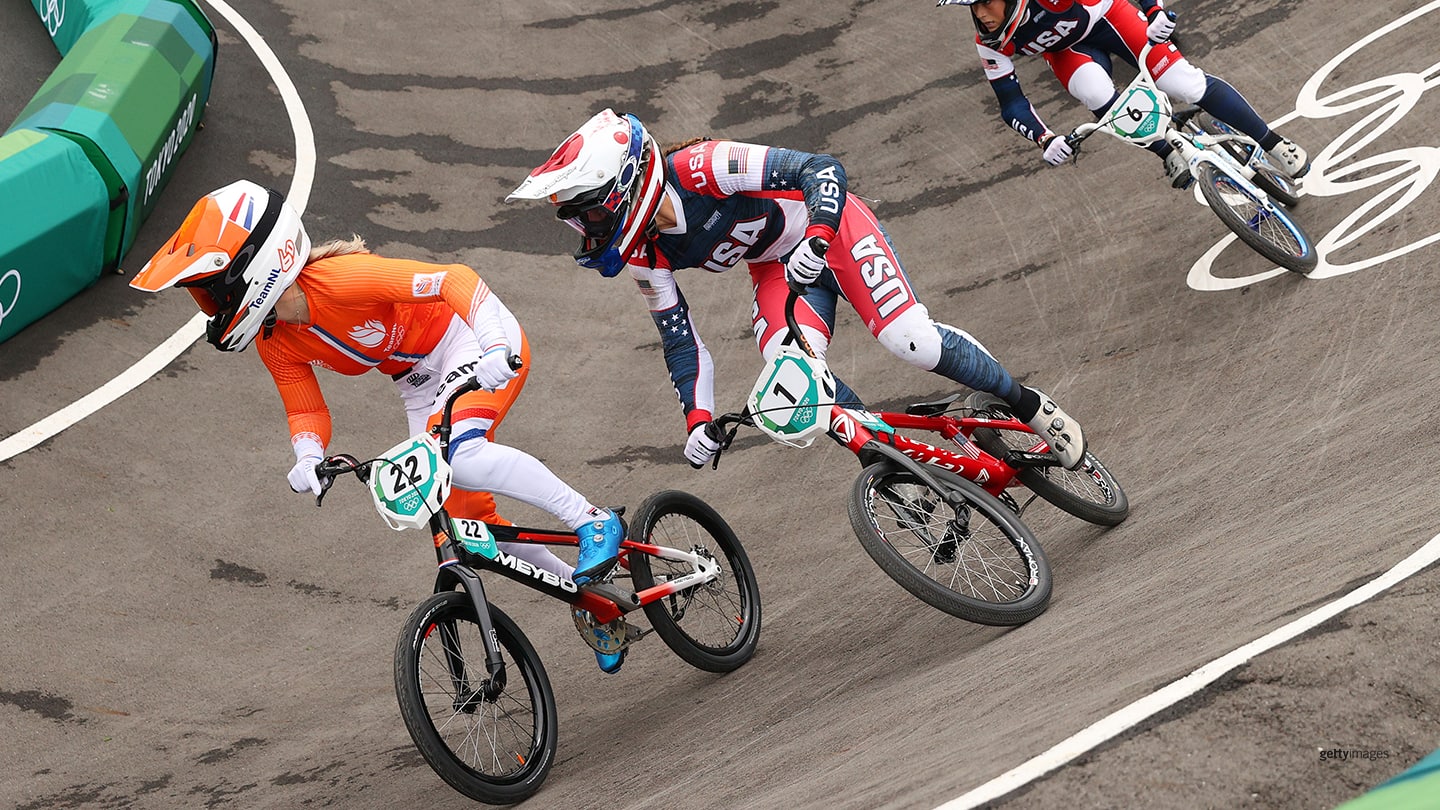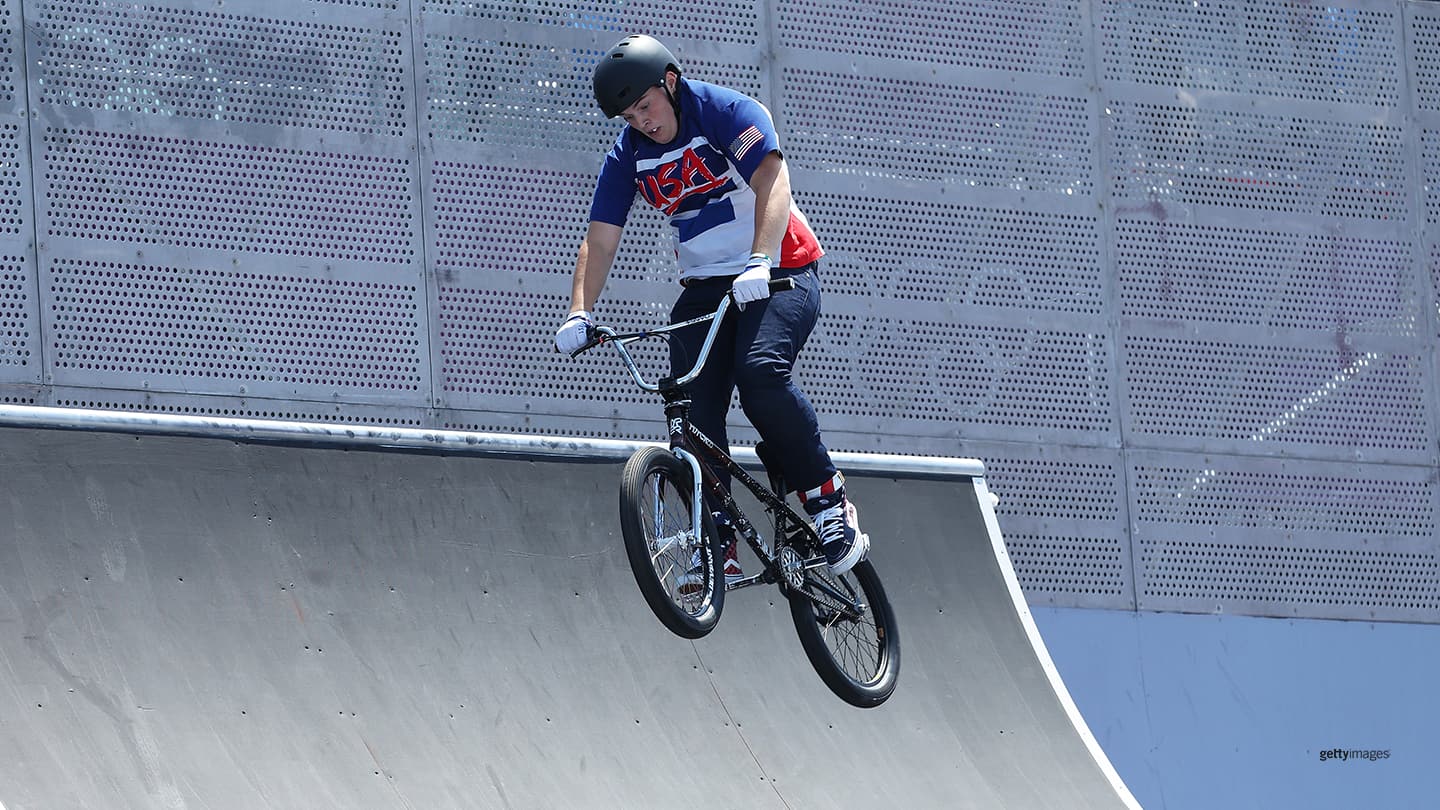
BMX Riders Alise Willoughby And Hannah Roberts On How Cycling Has Progressed For Women
by Lisa Costantini

Alise Willoughby competes during the women's racing BMX semifinals at the Olympic Games Tokyo 2020 on July 30, 2021 in Tokyo, Japan.
When BMX racer Alise Willoughby started going to the bike track at age six, she was one of only a few girls dropping in.
“My brother started about two weeks before me,” the now 31-year-old said. “He saw a couple girls and it opened his eyes.” After he shared what he saw with their parents, he encouraged them to send his little sister along the next time.
“There was only a handful of girls, but that allowed me to get into the sport. That representation opened my eyes to it being an option.”
Throughout her 25-year career on the bike, Willoughby has continued to follow in women riders’ footsteps.
“Growing up, there was a female by the name of Kim Hayashi, who rode for the company that I eventually rode for professionally,” said the St. Cloud, Minnesota native. Like Willoughby, Hayashi, 36, got started in the sport after following her brother to the bike track.
“I always looked up to her,” Willoughby shared. “She excelled at everything she did. On the track, she took risks and was ahead of her era, and I was always inspired to be like that. I also respected that she was on a team — at the time, Redline Bicycles — that professionally supported her and gave females that opportunity.”
Until BMX racing was added to the Olympic program in 2008, “the pro women were what you aspired to,” she said. But at that time, it wasn’t feasible for cycling to be your full-time job.
Once the Olympics came into the picture — 11 years after she started — the game changed.
“It’s pretty cool to see how far it’s come,” said the three-time Olympian and 2016 silver medalist. That includes prize money. “It wasn’t equal at the start, but it is equal now,” Willoughby added.
BMX Freestyle cyclist Hannah Roberts hopes that trend continues with her discipline having made its debut at the Olympic Games Tokyo 2020.
Roberts — the first American to qualify for the Games in BMX freestyle — originally was the only girl at the skate park when she first started cycling at nine years old.

Hannah Roberts competes during the women's park BMX freestyle final at the Olympic Games Tokyo 2020 on Aug. 1, 2021 in Tokyo.
Seven years later, she won her first world title at the age of 16.
Despite winning the silver medal in Tokyo, Roberts said it’s still difficult for a female rider to make a living doing BMX.
“That’s why for a long time, the progression of the women was so far underneath the men. Men could ride all day, every day and only worry about riding,” she revealed. “I think the only thing that every professional woman wants right now is to make it equal.”
Give the younger generation something to look forward to, she said.
Her hope as a woman is that “it will get to a point where young girls can see a sport and be like, I want to do that for a living, and they can make it happen.”
The U.S. women’s national soccer team is one reason the 20-year-old is optimistic that that future is possible.
“I watch a lot of their interviews. I look up to them as amazing athletes and amazing people in and out of their fields. That’s what inspires me,” she said.
As an Olympian, people now look at her as an inspiration. Since freestyle park was added to the program in 2017, the Buchanan, Michigan, native has been receiving messages of encouragement, including parents asking how to get their kids into riding because they are excited about the sport.
Not only was the interest from kids growing at a fast pace, but so was the level of riding Roberts was seeing from her fellow riders.
“Adding it to the Olympics made the level for both men and women grow so much because there was a new goal, a new opportunity,” she explained. Reaching that goal alongside the female athletes she grew up riding against — like Team USA’s Perris Benegas and Switzerland’s Nikita Ducarroz (who took third in Tokyo) — made the experience extra meaningful.
“It didn’t kick in until we were all sitting on the deck of our qualifying event, and one of the girls was like, this is it. We will drop in, and we’re officially Olympians,” Roberts said. “I’ve gotten to know them all as friends. We’ve traveled the world and experienced so much together. Becoming an Olympian with them was the most special thing.”
It’s a feeling she is looking to replicate again and again.
“I’m hoping the future has a few more Olympics in it for me. Then, when it’s time to retire, I want to get into coaching and help the upcoming generation of women.”
Be an inspiration, like so many who came before her.